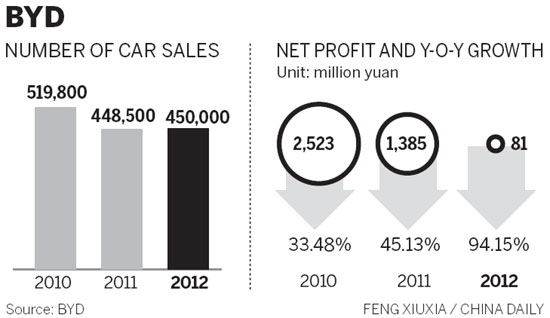BYD's profit slumps as sales disappoint
Updated: 2013-03-01 11:12
By Li Fangfang (China Daily)
|
||||||||

Despite China's slowing but still growing automobile market, domestic battery and car manufacturer BYD Co Ltd experienced a continuous sales decline in the past three years, as well as a record dip in revenue and profits.
The waning business performance rendered impossible the Warren Buffett-backed company's previous ambition of having the most automobile sales by any Chinese company by 2015 and overtaking Toyota as the world's No 1 carmaker by 2025, with annual sales of more than 10 million cars.
BYD said in its 2012 financial report filed to the Shenzhen Stock Exchange on Wednesday that its net profit slumped 94.15 percent year-on-year to 81 million yuan ($13 million), the lowest in at least four years, while revenue declined 4.29 percent to 46.7 billion yuan.
The company's shares on the Shenzhen Stock Exchange rose 1.29 percent to close at 25.22 yuan on Thursday.
The Shenzhen-based company attributed its poor performance to the gloomy global solar energy market and a stagnant mobile phone industry.
It also said in the statement that the slowing domestic automotive market reinforced the difficulties faced by BYD's vehicle business, which accounts for half of its revenue.
The slowing market, which saw surging growth of more than 30 percent in 2009 and 2010, and drop to low single digits in the following two years, has crushed the market share of China's homegrown auto brands, including BYD.
In 2012, the company sold 450,000 vehicles in China, 3 percent up on the previous year.
However, the figure was much lower than its target of 800,000 vehicles set for 2010, when it sold 519,800 cars.
Following a sharp sales decline in 2010, BYD's net profit dropped 45 percent in 2011, when it laid off almost 5,700 employees.
The gloomy prospects amid the continuous business slump saw the resignation of several of its top executives in the past three years, after they cashed in almost 1 billion yuan in company stock.
BYD has now set a "conservative" sales target of 500,000 vehicles for 2013, up 10 percent year-on-year.
It also reduced the number of its dealerships from 1,200 to 800, after three years of restructuring and adjustment, said BYD Chairman Wang Chuanfu.
However, analysts said that the company lacks innovative technology or products that enable it to compete with its domestic and foreign rivals in the passenger car sector.
Ling Yun, an auto analyst with Ping'an Securities, added that the short-term future remains uncertain for China's new energy vehicle industry.
"It will take some time before mass production of new energy vehicles takes place in China and they can be accepted by the majority of customers. This poses problems for BYD's short-term development," said Ling.

 Li Na on Time cover, makes influential 100 list
Li Na on Time cover, makes influential 100 list
 FBI releases photos of 2 Boston bombings suspects
FBI releases photos of 2 Boston bombings suspects
 World's wackiest hairstyles
World's wackiest hairstyles
 Sandstorms strike Northwest China
Sandstorms strike Northwest China
 Never-seen photos of Madonna on display
Never-seen photos of Madonna on display
 H7N9 outbreak linked to waterfowl migration
H7N9 outbreak linked to waterfowl migration
 Dozens feared dead in Texas plant blast
Dozens feared dead in Texas plant blast
 Venezuelan court rules out manual votes counting
Venezuelan court rules out manual votes counting
Most Viewed
Editor's Picks

|

|

|

|

|

|
Today's Top News
Boston bombing suspect reported cornered on boat
7.0-magnitude quake hits Sichuan
Cross-talk artist helps to spread the word
'Green' awareness levels drop in Beijing
Palace Museum spruces up
First couple on Time's list of most influential
H7N9 flu transmission studied
Trading channels 'need to broaden'
US Weekly

|

|







